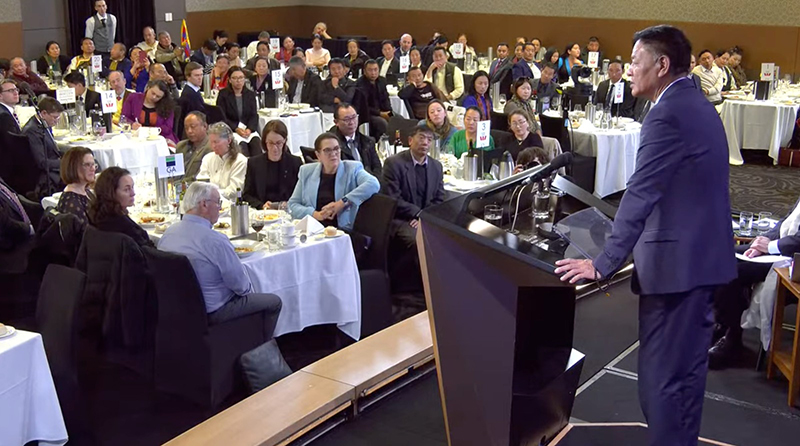Canberra – Sikyong of the Central Tibetan Administration addressed the National Press Club of Australia on the theme "Resolving the Sino-Tibetan conflict and securing peace in the region" on June 21, 2023. Sikyong highlighted the lack of freedom in Tibet and described Tibet as a prison under Chinese rule, adding that "Tibet has no political or civil rights under Chinese rule". He also called on Australia to impose sanctions on Chinese officials for their human rights violations.
Sikyong penpa Tsering began his speech by talking about the Chinese government's ongoing repression in Tibet, criticizing the lack of political freedom and mobility in the region without civil rights, calling it a prison locked down by China. He spoke of the system of confinement and how it affects the lives of many people at once. Tsering also spoke of the excessive surveillance imposed on citizens and the restrictions placed on the free flow of information concerning human rights violations committed against Tibetans.
Despite attempts by Chinese Embassy officials in Australia to prevent him from appearing at the National Press Club, Sikyong addressed journalists in Canberra. He made light of it, saying that it was yet another instance of Beijing serving as Tibet's "best publicity agent".
Sikyong expressed his grave concerns over the lives of Tibetan monks and nuns, he stated that the number of monks and nuns present in Tibet has reduced drastically ever since China occupied Tibet. Tsering highlighted how the management of monastic institutions is being taken over by agencies of state security and the united work fund. "Surveillance cameras are installed in all monasteries to monitor the movements of monks and nuns," he said.
He further brought attention to use of mechanisms like DNA profiling, electronic identification, geolocation etc. to control the Tibetan population in the name of "national security" and "social stability". He stressed on how the use of new technologies to govern Tibet poses a threat on the Tibetan population. Sikyong stressed that the Chinese government's interference in the succession of His Holiness the Dalai Lama is merely an attempt to influence and control the 15th Dalai Lama, whom it hopes to use as a pawn in its control of the Tibetan people and other Buddhist nations.
He denounced the Chinese government's policy of placing Tibetan children in colonial boarding schools, claiming that they are forcibly removed from their families. "Around one million of the seven million Tibetan children are placed in colonial-style boarding schools," he said, comparing the situation to the way the Australian government treated First Nations children during the "Stolen Generations" period. He accused the Chinese administration of acting knowingly and deliberately towards the Tibetan people, without the slightest remorse.
Sikyong asserted that Chinese policies were aimed at depriving Tibetans of their identity, and said that Tibetans were resisting the Chinese authorities through non-violence, because they believed in non-violence and wanted the world to be peaceful.
He also spoke of the geographical importance of Tibet, which he described as the "roof of the world". Tsering explained that many rivers originate in Tibet and flow downstream to other countries such as India, Vietnam, Cambodia, Laos, Thailand, Burma, Bangladesh, Nepal, Bhutan and Pakistan, and that China's decisions and actions in this area are destroying the livelihoods of these downstream countries, causing a food security and water supply crisis.
Sikyong spoke of the Middle Way Approach to resolve the Sino-Tibetan conflict, declaring that "if the Sino-Tibetan conflict could be resolved by the Middle Way in a non-violent way, there could be more peace in the region and better relations between China and Tibet". He urged international communities to stop saying that Tibet is part of China, and to recognize Tibet's historically independent status. He insisted that, according to the Middle Way Approach, Tibet is not asking for total independence but for "meaningful autonomy" so that Tibetans can practice their religion, language and culture peacefully under the authority of the People's Republic of China. "The question is not who governs, but the quality of what governs", he declared.
Sikyong's speech was followed by questions from the journalists present at the National Press Club, which he answered one by one.


![Tibet has a rich history as a sovereign nation until the 1950s when it was invaded by China. [Photo: File]](/images/stories/Pics-2024/March/Tibet-Nation-1940s.jpg#joomlaImage://local-images/stories/Pics-2024/March/Tibet-Nation-1940s.jpg?width=1489&height=878)
















